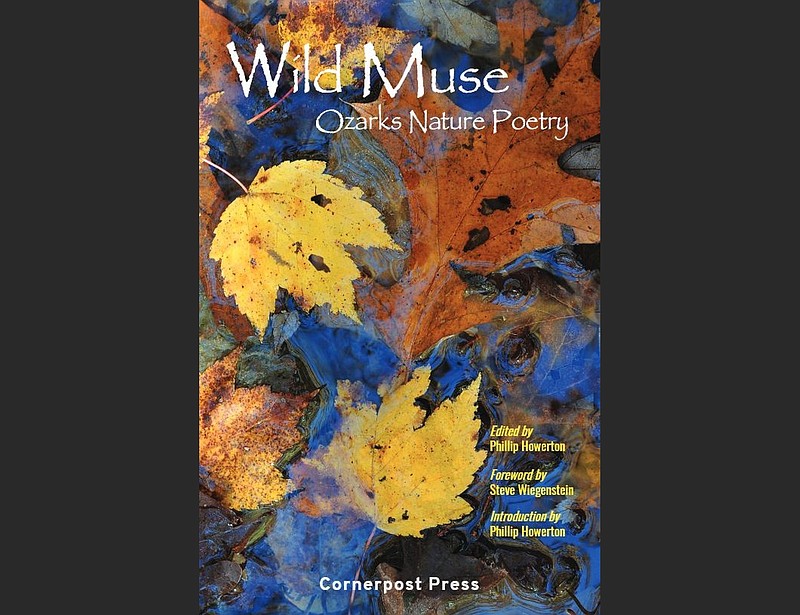"Wild Muse: Ozark Nature Poetry" (Cornerstone Press, $19.95 paperback) is another project edited by Phillip Douglas Howerton, an apparently indefatigable professor of English at Missouri State University, whose useful and surprising anthology, "The Literature of the Ozarks," was published by the University of Arkansas Press in 2019.
Howerton, who also edits two regional academic journals, is a poet and, presumably in his spare time, owns and runs Cornerstone Press. He styles "Wild Muse" as a "chaptology," which means it's structured something like a collection of individual poets' chapbooks, about 20 pages or so, supplemented with brief, insightful and usually autobiographical essays.
As the title suggests, these are poems of place and nature, and while I'm often reminded that there is a limited audience for such a thing as poetry, most of them seem both accessible and germane to the way readers of the Arkansas Democrat-Gazette live now.
"I find that living in a place I have known since birth, a place I have walked in all seasons and glimpsed from every angle, influences my poetry immeasurably," Missouri C.D. Albin muses in his bio. "I would likely be a very different poet without this place. Possibly I would not be a poet at all."
I set the book on a corner of my desk and resolved to dip into it from time to time and maybe, before too many weeks had passed, write about it. Maybe not a full review, but more than a mention. While the limits of time and spaces enforce a brutal triage on the books that flow through my office, I figure people deserve to know a book about their neck of the woods.
Then the news came down last week that one of the poets featured in "Wild Muse," Mark Spitzer, had died.
Spitzer was, for the past 15 years or so, a professor of creative writing at the University of Central Arkansas. He might be best known as the founder and editor of Toad Suck Review, a lively and anarchic literary journal that incorporated some of the DNA of Andrei Codrescu's ongoing Exquisite Corpse project.
He also wrote and published more than 30 books (Amazon.com lists 39), which include translations of works by Arthur Rimbaud, Jean Genet, George Bataille and Louis-Ferdinand Celine, and a memoir of his time living in the Paris bookstore Shakespeare & Company with a "bipolar nymphomaniac." He wrote comic novels and plays and, according to one reviewer, a "lively and often hilarious book about writing pedagogy" that "manages to convey practical and acutely observed points about writing with detail, wild curiosity and verve backed up with scholarly support."
He also wrote a lot about big ugly fish — he had to be a world expert on the alligator gar — and caught big ugly fish in more than 20 countries. He was a happy man whenever I talked to him, which wasn't often enough.
I first met Spitzer shortly after he arrived at UCA. I was introduced to him by Codrescu, the Romanian-born poet and essayist who became known as a commentator for National Public Radio in the '80s and '90s. Spitzer was instrumental in convincing Codrescu and UCA to publish an ink-on-paper annual edition of Codrescu's Exquisite Corpse online literary journal.
Spitzer's history with Codrescu and the Corpse went back to 1995 when he was a graduate student at the University of Colorado. Spitzer had submitted to the Corpse (which then existed as a print magazine; the history is long and convoluted) an Oedipal story, "Dinner With Slinger," that portrayed his professor, poet Ed Dorn, as a lecherous drunken blowhard and served as a kind of benediction for a generation raised in the intellectual sterility of pop culture. (The story is collected, along with some of Spitzer's other nonfiction pieces, in his 2007 book "Riding the Unit," published by Six Gallery Press.)
Codrescu published Spitzer's story, resulting in a "Dornstorm" of polemic screeds attacking and defending the young writer. (One described Spitzer as a sexually confused "failed grad student" who should join "the Church of Rushing Newts," which I think was a statement about his politics.)
Two years later, Spitzer enrolled in the master's of fine arts program at Louisiana State University (where Codrescu is now an emeritus professor in English) and in 2000 became assistant editor of Exquisite Corpse, where he found himself editing the work of many of the writers he'd antagonized.
Spitzer's contributions to "Wild Muse" include a meditation of a cave-dwelling lizard called the Green Gowrow and an investigative poem concerning the ghost of a disappeared professor from Kansas — with "mongo shell rim spectacles'" — still seen being dragged through the water by a fish he'd hooked.
There is a lot more to "Wild Muses" than Spitzer's bit — Howerton is a poet of some power, and the East German-born Agnes Vojta's work feels both delicate and as perennial. Other marvels will no doubt reveal themselves.
Email: pmartin@adgnewsroom.com
